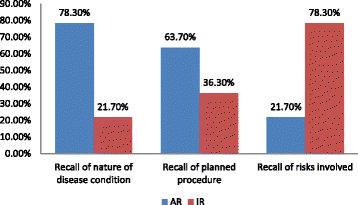Informed consent for clinical treatment in low-income setting: evaluating the relationship between satisfying consent and extent of recall of consent information
- PMID: 29197378
- PMCID: PMC5712194
- DOI: 10.1186/s12910-017-0227-4
Informed consent for clinical treatment in low-income setting: evaluating the relationship between satisfying consent and extent of recall of consent information
Abstract
Background: Treatment informed consent aims to preserve the autonomy of patients in the clinician - patient relationship so as to ensure valid consent. An acceptable method of evaluating understanding of consent information is by assessing the extent of recall by patients of the pieces information believed to have been passed across. When concerns are not satisfactorily addressed from the patients' perspective, recall of consent information may be low.
Methods: This study is a questionnaire - based cross - sectional interview of consecutive adult surgical patients who could give their respective medical histories and who were booked for elective major surgical procedures over a period of 7 months in a tertiary health institution in southeastern Nigeria. Four to five days after a formal consent session, during ward admission, extent of recall of information on the nature of the disease condition or diagnosis, the nature of the planned procedure and the risks involved in the planned procedure were assessed and analyzed on the background of how satisfying the consent sessions were from individual patient's perspective.
Results: Generally, the recall of nature of disease condition and nature of planned procedure is better than recall of risks involved in the planned procedure. More specifically however, recall in these 3 domains is significantly better among the patients that affirmed that their concerns were satisfactorily addressed.
Conclusion: The findings from this study support that no effort should be spared in ensuring that the consent information are satisfying to the patients from the patients' viewpoint.
Keywords: Information recall; Informed consent; Patients’ concerns.
Conflict of interest statement
Ethics approval and consent to participate
Ethical clearance was obtained from the Ethics Committee of the University of Nigeria Teaching Hospital, Ituku-Ozalla, Enugu Nigeria. NHREC/05/01/2008B–FWA00002458-1RB00002323. Oral consent to participate was obtained from all participants in this study.
Consent for publication
Not applicable.
Competing interests
The authors declare that they have no competing interests.
Publisher’s Note
Springer Nature remains neutral with regard to jurisdictional claims in published maps and institutional affiliations.
Figures
References
-
- Beauchamp TL, Childress JF. Principles of biomedical ethics. 7. NJ: Oxford University Press; 2012.
-
- Berg JW, Appelbaum PS, Lidz CW, Parker LS. Informed consent: legal theory and clinical practice. 2. NJ: Oxford University Press; 2001.
MeSH terms
LinkOut - more resources
Full Text Sources
Other Literature Sources


